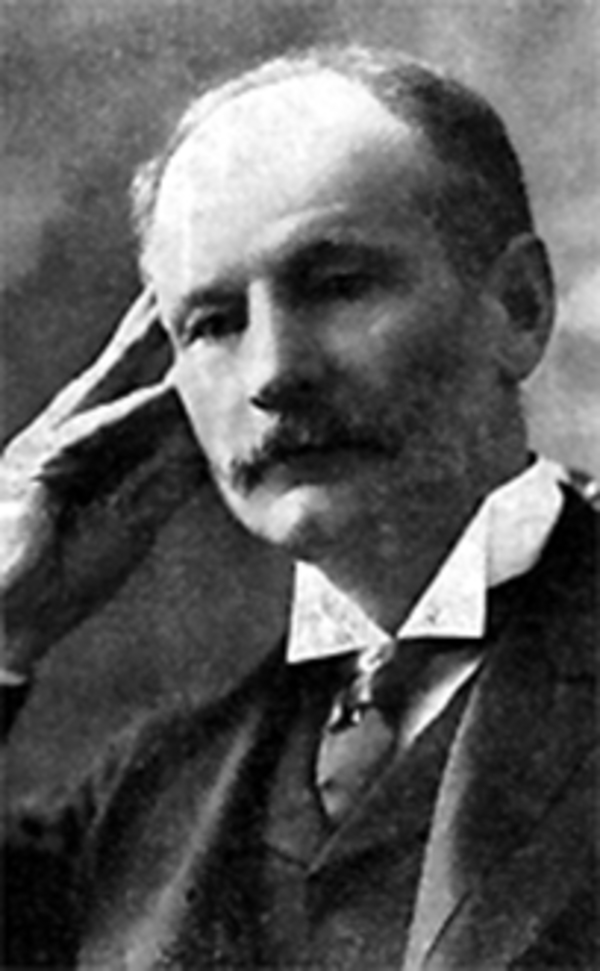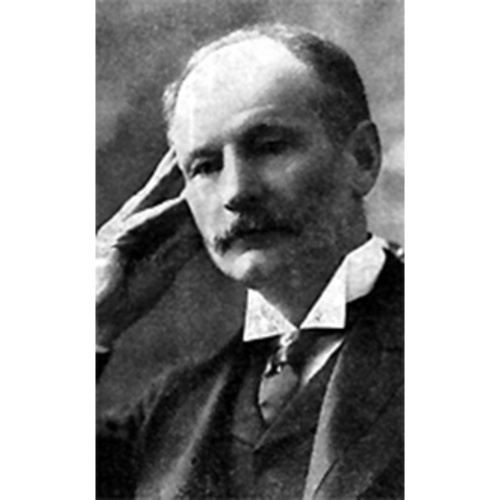
Source: Link
TOWNSHEND, Sir CHARLES JAMES, lawyer, politician, judge, and historian; b. 22 March 1844 in Amherst, N.S., son of George Townshend and Elizabeth Lucy Stewart; m. first 23 April 1867 Laura Kinnear (d. 1884) in Amherst, and they had two sons and four daughters; m. there secondly 25 Oct. 1887 Margaret MacFarlane (d. 1928), and they had two sons; d. 16 June 1924 in Wolfville, N.S., and was buried in Amherst.
By blood, outlook, religion, and education, Charles Townshend was a true specimen of the old-regime elite in the Maritimes. His paternal grandfather was William Townshend*, an early collector of customs in Prince Edward Island. His father served as rector of Christ Church, Amherst, for over 60 years, and through his mother, a daughter of judge Alexander Stewart*, Townshend was connected to the Dickey, Ritchie, and Tupper legal dynasties. A graduate of King’s College, Windsor (ba 1863, bcl 1872), Townshend was to sit on its board of governors from 1881 to 1886, become part of the reconstituted “faculty of civil law” in 1890, and act as chancellor from 1912 to 1922. King’s would award him an honorary dcl in 1908.
After serving three years of his apprenticeship in Amherst and the final year in Halifax, Townshend was called to the bar in 1866. In 1868 he succeeded to the large Amherst practice of his uncle Senator Robert Barry Dickey. A decade later he admitted his brother John Medley Townshend and his cousin Arthur Rupert Dickey as partners. Amherst in the last quarter of the 19th century was developing a diversified industrial economy, based on nearby coalmines and good rail connections [see Nelson Admiral Rhodes*]. The combination of family prestige, economic growth, and Townshend’s own talent would bring him an extensive clientele, including locally based corporations such as the Amherst Boot and Shoe Manufacturing Company, of which he was a promoter and director, and the Cumberland Railway and Coal Company. In 1880 he was created a dominion qc.
In spite of his professional success Townshend was dissatisfied in the early 1880s. Scholarly and reserved, he was temperamentally suited to the judicial role, and as he explained candidly to Premier John Sparrow David Thompson* in 1882, “My tastes and ambition . . . have been to excel in the profession – outside of it – for politics I care nothing, and only went into them, with a view to the Bench.” He also began to yearn for horizons larger than Amherst could offer, but his overtures to join Thompson’s law firm in Halifax were rebuffed.
Townshend’s political career had begun with an unsuccessful attempt to obtain a seat for Cumberland County in the House of Assembly in 1874; he had better luck there in the Conservative sweep of September 1878. As minister without portfolio in the government of Simon Hugh Holmes*, he was notable mainly for drafting the County Incorporation Act of 1879, which ended the antiquated system of local government by the sessions magistrates. Townshend retained his seat after the Conservative rout in 1882, but two years later an arrangement with Cumberland Liberals saw him acclaimed as successor to Sir Charles Tupper*’s seat in the House of Commons [see Thomas Reuben Black*]. Once Thompson became dominion attorney general in 1885, he received a stream of increasingly admonitory letters from Townshend regarding the judgeship that Tupper had allegedly promised him.
On 4 March 1887 Townshend was named to the Supreme Court of Nova Scotia, and he moved to Halifax shortly thereafter. The court was much in need of rehabilitation after a series of mostly indifferent appointments. Thompson’s nomination of Townshend was part of his strategy to improve the court through a new emphasis on professional competence. This approach did not render partisan service irrelevant to judicial promotion – it remained fundamental – but it did add a new element to the calculus of patronage; none of Thompson’s other four appointees to the Nova Scotia court had held elective office, though all were Conservatives. On 2 Nov. 1907 Prime Minister Sir Wilfrid Laurier* would follow Thompson’s lead by elevating Townshend, then the senior judge, to the chief justiceship on the resignation of Sir Robert Linton Weatherbe*, resisting political pressure to promote the junior puisne judge, Liberal Arthur Drysdale. In response to his increasing deafness, Townshend had earlier adopted a rather unbecoming ear trumpet. When he asked his fellow judges how it looked, his colleague Benjamin Russell* observed that “there was no great alacrity in replying, but Mr. Justice Weatherbe was equal to the occasion with the remark: ‘What matters it how it looks if it enables you the better to discharge your duty?’” Townshend was made a knight bachelor in 1911 and retired on 10 April 1915; Wallace Nesbit Graham* succeeded him as chief justice. At the end of his life Townshend had the satisfaction of seeing his youngest son, Cecil Wray, take up the legal profession; he graduated from Dalhousie law school in 1923.
During Townshend’s tenure a great deal of new federal and provincial legislation was passed. Cases involving temperance regulation, mining law, the power of corporations and municipalities, and legislation relating to married women’s property all came before the court with increasing regularity. Townshend was an able jurist and his legal opinions were well respected in the Supreme Court of Canada; his views, however, tended to be conservative. When in parliament he had opposed women’s suffrage, and in a number of decisions he gave a restrictive interpretation to Nova Scotia’s Married Women’s Property Act of 1884 until it was substantially amended in 1898.
If he was best known to contemporaries as a judge, Townshend will be remembered mostly as a historian. His book on the history of the provincial courts of common law and equity marks the first serious institutional study of Nova Scotia courts. Based largely on original documents, it approaches professional historical standards. Townshend also published a book-length study of his grandfather Stewart and several shorter biographies of provincial Supreme Court judges, which are informative but hagiographical in tone.
Townshend delivered the oration at the public celebrations marking the 150th anniversary of representative government in Nova Scotia in 1908, and since that date the commemoration of 1758 has totally eclipsed any celebration of the achievement of responsible government. In contrast to early Victorian celebrations, in which representatives of the black and native communities played a part and which sometimes included women, the 1908 event was a white, indeed Anglo-Saxon, male show, constructed to illustrate the superiority of the British race and to bathe provincial institutions in the reflected light of imperial glory. Townshend’s imperial bent revealed itself in his private life as well. He insisted that his family descended from the noble Townshends of Norfolk, although the authors of Burke’s peerage were not convinced; his summer home in Wolfville was named Raynham, after the Townshends’ principal manor in England.
Sir Charles Townshend was unusual in being a scion of the old elite who played by the new rules of partisan politics and succeeded. He exploited the economic opportunities of his age as a corporate promoter and business lawyer, and served the public well as a judge, but in his writings and public utterances he adopted an imperialist stance which ultimately veered into nostalgic anglophilia.
[There is a small fonds of Townshend papers at NSARM, which features “A short record of the Townshend family,” written by Charles James Townshend for his descendants in 1896. Perhaps Townshend’s rather severe nature has discouraged biographers: the only published account aside from the standard biographical dictionaries is R. E. Inglis, “Sketches of two chief justices of Nova Scotia,” N.S. Hist. Soc., Coll. (Halifax), 39 (1977): 107–19. For the political and legal background, P. B. Waite, The man from Halifax: Sir John Thompson, prime minister (Toronto, 1985), is indispensable; see also Philip Girard, “The Supreme Court of Nova Scotia, responsible government, and the quest for legitimacy, 1850–1920,” Dalhousie Law Journal (Halifax), 17 (1994): 430–57.
Townshend’s own writings were extensive. His best work, still useful today, is contained in two long articles on the history of Nova Scotia courts which appeared in instalments in the Canadian Law Times (Toronto), the first in vol.19 (1899) on the courts of judicature (in fact, restricted to the Inferior Court of Common Pleas and the Supreme Court) and the second in vol.20 (1900) on the Court of Chancery. These articles were published together in 1900 by Carswell of Toronto, under the misleading title History of the Court of Chancery in Nova Scotia (Toronto, 1900). Townshend’s “Life of Honorable Alexander Stewart, c.b.,” appeared in N.S. Hist. Soc., Coll., 15 (1911): 1–114 and was published in book form, probably as a vanity edition, the same year. Townshend’s writings include three additional sketches in the Coll.: “Memoir of the life of the Honourable William Blowers Bliss,” 17 (1913): 23–45; “Jonathan Belcher, first chief justice of Nova Scotia,” 18 (1914): 25–57; and his final paper, “The Honourable James McDonald,” 20 (1921): 139–53. p.g.]
LAC, MG 26, D, Townshend to Thompson, 11, 14, 19 July 1882; 9 July, 24 Dec. 1886; 1 Jan. 1887; Townshend to A. W. McLellan, 18 Dec. 1886. NSARM, MG 100, 49, no.14; RG 39, ser.M, 2, file 49. Amherst Gazette (Amherst, N.S.), 11 March 1887. Halifax Herald, 17 June 1924. E. M. Macdonald, Recollections, political and personal (Toronto, [1938?]), 128–29. Benjamin Russell, Autobiography of Benjamin Russell (Halifax, 1932), 251–53.
Cite This Article
Philip Girard, “TOWNSHEND, Sir CHARLES JAMES,” in Dictionary of Canadian Biography, vol. 15, University of Toronto/Université Laval, 2003–, accessed December 31, 2025, https://www.biographi.ca/en/bio/townshend_charles_james_15E.html.
The citation above shows the format for footnotes and endnotes according to the Chicago manual of style (16th edition). Information to be used in other citation formats:
| Permalink: | https://www.biographi.ca/en/bio/townshend_charles_james_15E.html |
| Author of Article: | Philip Girard |
| Title of Article: | TOWNSHEND, Sir CHARLES JAMES |
| Publication Name: | Dictionary of Canadian Biography, vol. 15 |
| Publisher: | University of Toronto/Université Laval |
| Year of publication: | 2005 |
| Year of revision: | 2005 |
| Access Date: | December 31, 2025 |



